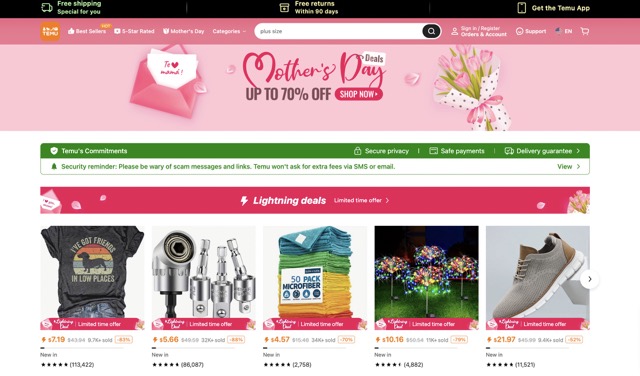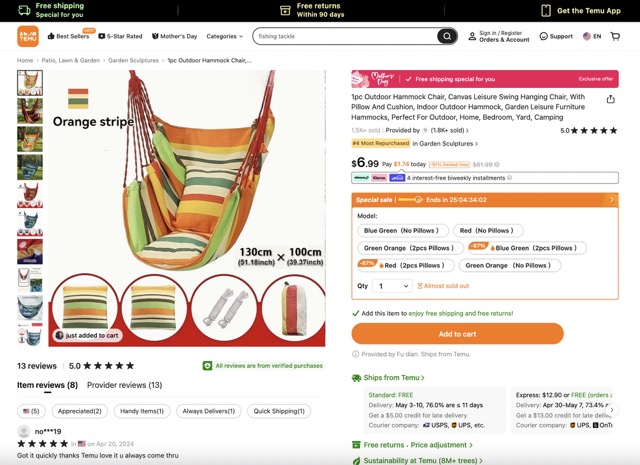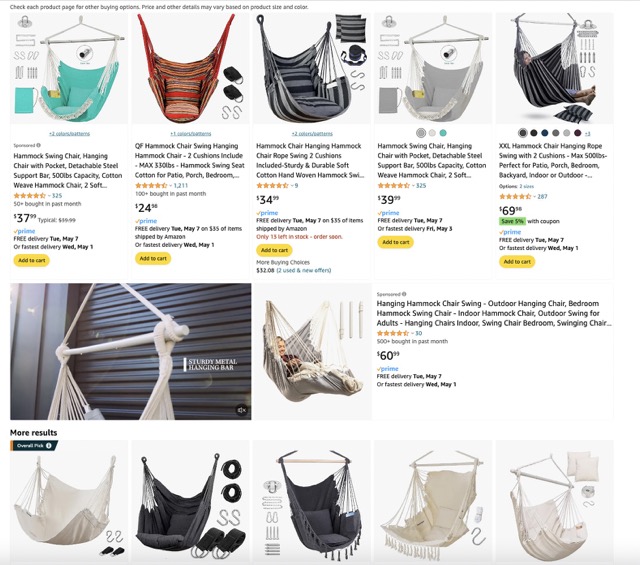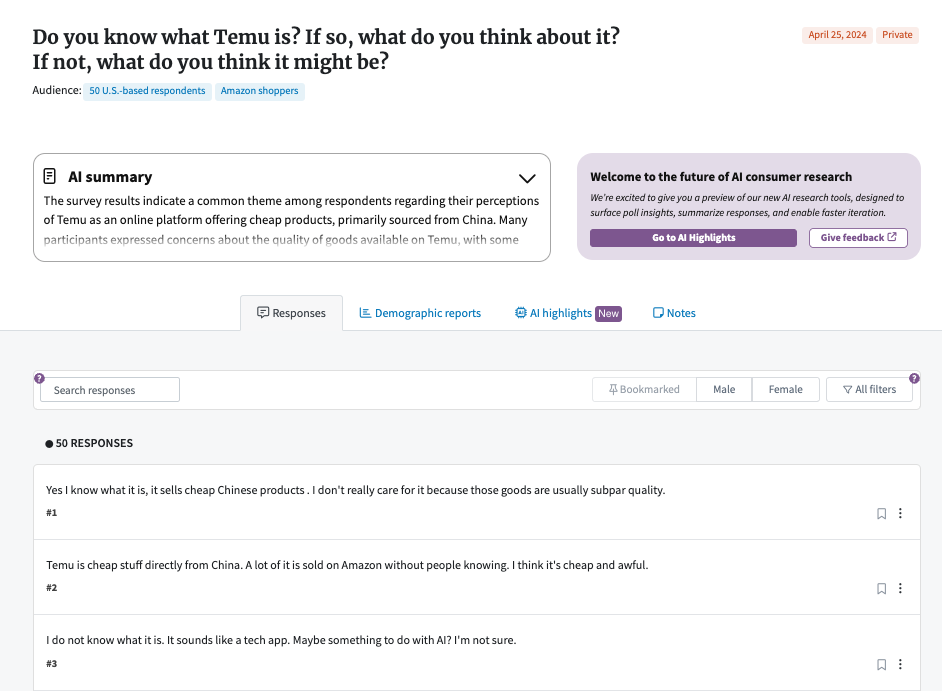Is Temu a threat to Amazon sellers – and should you be worried? This guide compares Temu and Amazon’s business models, showing why Temu’s ultra-low prices and manufacturer-to-consumer model appeal to bargain shoppers, but aren’t yet viable for third-party e-commerce sellers. With insights from a PickFu brand perception poll, the post explains how Amazon sellers can stay competitive by offering higher-quality products, sustainable options, and better customer experiences. Perfect for online retailers asking, “Can I sell on Temu?” or “How does Temu compare to Amazon FBA?”
Temu and Amazon are two of the most widely recognized e-commerce platforms in the world.
Each one stands out in the global market for different reasons. Amazon has built a vast ecosystem that spans everything from retail to cloud computing.
Pretty impressive for a company that started out as an online bookseller in the late 1990s.
Amazon now caters to a huge audience that includes individual shoppers, web developers, and other businesses. And yes, there’s still a market for anyone interested in selling books on Amazon.
Temu, on the other hand, is a newcomer. Launched in 2022 by Pinduoduo – a giant in China’s e-commerce landscape – Temu entered the market with a unique approach.
It focuses on offering low-priced products by connecting consumers directly with Chinese manufacturers. This is a different business model from Amazon, where many sellers buy products from manufacturers, mark the prices up, and re-sell them for a profit.
The goal of Temu’s business model is to remove the middleman – which, in turn, reduces costs.
The resulting low prices majorly appeal to budget-conscious shoppers.
But can you actually start an e-commerce business with Temu in America?
Let’s find out.
Can anyone sell on Temu’s online marketplace?
If you want to know how to sell on Temu, the short answer is you can’t.
Not yet, anyway.
The slightly longer answer is that the only people who can really sell on Temu are Chinese manufacturers. Remember: Temu’s business model involves getting rid of the middlepeople, not adding them.
So, unless you live in China and manufacture products you want to sell directly to consumers, Temu is out. (For now. According to the Associated Press, the company will soon be opening its doors to U.S. and European sellers. It’s not clear if that means individual sellers or manufacturers, and Temu didn’t provide any further clarification.)
There is a way to make money on Temu, though. But it’s not geared toward e-commerce sellers. You can either:
- Sign up for Temu’s affiliate program: With this referral program, shoppers can share a special code with their friends and earn up to a 20% commission when someone uses it to buy a Temu product.
- Apply for Temu’s influencer program: If you’re an influencer with a huge social media following on sites like TikTok and Instagram, you might qualify for the Temu Influencer program. Temu says its influencers can make big bucks selling on TikTok and other sites – up to $500 in cash every other month, plus up to $100,000 in monthly affiliate cash and $1,000 in free products.
Essentially, the only way to earn money on Temu is to basically join the Temu marketing team.
But it’s still worth exploring the ins and outs of Temu if you’re an online retailer. Especially if you’re nervous that Temu will steal your business.
Let’s dig a little deeper into the pros and cons of the e-commerce giant.
The pros and cons of Temu
Since Temu isn’t like Amazon or Etsy – in other words, it’s not an e-commerce-seller-friendly marketplace – we’re going to look at it from the consumer’s viewpoint.
Here’s what the Temu homepage looks like.
As you can see, there’s a huge emphasis on low pricing. Everything is (supposedly) majorly marked down.
We did a little bit of digging to see if we could find Temu products on Amazon – to see if products really are that much cheaper when you buy them directly from Temu.
Check out this hammock, for example.
On Temu, it’s only $6.99. It comes with free shipping.
We couldn’t find the exact same hammock on Amazon, but we did find many similar ones. Zero of them cost $6.99 a piece – they’re all higher than $25 each, with free shipping for Amazon Prime members.
So one of Temu’s pros, clearly, is that it’s inexpensive. It also has a wide range of products, free shipping, and a generous 90-day return policy.
And if customers want to gamify their shopping, they can do that with the Temu app, which bakes cheery and addicting games into the shopping process.
But there are a few things going against Temu here:
- It’s too new. While Chinese shoppers are very familiar with Temu’s parent company, PDD Holdings, English-speaking countries aren’t. Because of that, Temu hasn’t built up the same trust level Amazon enjoys. Even if the products come from the same place.
- It goes against the price-quality schema. It’s a well-established theory in marketing that in a customer’s eyes, lower prices indicate lower quality. (We explore this topic a little more in our guide to understanding price sensitivity.)
- It’s not sustainable. As climate change marches forward, customers have become more aware of which products and services impact the environment less than others. Temu isn’t known for its commitment to sustainability. Sure, it has a little page about how it’s planting trees in Africa, but Temu products themselves aren’t marketed as sustainable. Amazon isn’t exactly a shining star in this regard either, but it has begun to push sustainable products to keep up with customer demand.
And then there’s the general perception of Temu.
Temu’s brand perception according to PickFu respondents
We ran a PickFu poll to gauge Temu’s brand perception in the United States. We asked 50 U.S.-based Amazon shoppers these questions: “Do you know what Temu is? If so, what do you think about it? If not, what do you think it might be?”
Here’s a sample of some of the comments our Open-Ended poll received:
- “Temu is cheap stuff directly from China. A lot of it is sold on Amazon without people knowing. I think it’s cheap and awful.”
- “I am familiar with Temu. I ordered a few things and found that the quality is not consistent. Some items were of good quality, others were junk. Not worth saving a few bucks to order from it.”
- “I have spent close to $1,000 dollars on that site. I shop there just about every day. I have had nothing but positive experiences with it. Returns are easy and the prices are great as is the selection.”
- “I know that Temu is an online company that ships products directly from China very cheaply. I don’t like the company. I think it is exploitative and is contributing to the decline of the environment.”
- “I don’t know what Temu is. One possibility is that Temu could indeed be a traditional Indonesian fermented soy product, similar to tempeh.”
We couldn’t help throwing that last response in there.
That respondent must have missed Temu’s Shop Like a Billionaire Super Bowl ad campaign.
After analyzing the responses, our AI sentiment tool summed up the general perception well. The people who know what Temu is like the good deals, the easy returns process, and the fun shopping experience. And most respondents in the poll do know what Temu is.
But they don’t like the perceived lack of high-quality products, and they’ve got concerns about privacy, security, and Temu’s environmental impact.
What does this mean for Amazon sellers?
It means you should aim to be all the things Temu is, at the moment, not. And if you don’t want to sell on the platform, is Temu going to steal your entire customer base as an online seller?
Is Temu going to steal my Amazon customer base?
Amazon still holds around 37 percent of the market share in the United States, according to a 2023 Statista survey. The next-biggest competitors are Walmart, Apple, eBay, and Target.
Temu isn’t even on this list – yet.
Instead, it’s starting to overtake Dollar General, a popular U.S. discount store. Maybe this is due to Temu’s prices, or perhaps it has to do with product quality. Whatever the reason, Temu isn’t quite in the same rank as Amazon, Walmart, eBay, and other similar stores with an online shopping marketplace.
So try not to worry too much about Temu. If you’re wondering if Amazon FBA is still worth it, the answer is absolutely.
Look for ways to:
- Build trust in your brand with high-quality products, fast shipping times, free returns, great customer service, and compelling, user-friendly listings
- Use pricing strategies that don’t make your products scream dollar store!
- Do your due diligence with Amazon product research, with the goal of sourcing more sustainable products and applying for Climate Friendly Pledge badges
That last point is more important than you think. As you saw from our PickFu poll, shoppers are worried about the environment. The Harvard Business Review argues that a genuine commitment to sustainability will soon become the deciding factor in whether shoppers convert to a brand.
And if you need help polishing your listings, choosing keywords for Amazon, and increasing traffic to your Amazon store, PickFu can help.
With our polls, you can run fast and valuable Amazon A/B testing to see which types of products your customers love. With written feedback from our respondents, you can nail your Amazon SERP optimization, grow your passive income on Amazon, and stay ahead of the Temu craze.
FAQs
What are the main differences between Temu’s and Amazon’s business models?
The biggest difference between Temu’s and Amazon’s business models is that Temu is a manufacturer-to-consumer marketplace. With Amazon, manufacturers sell products to retailers for cheap. The retailers then mark them up and sell them to consumers for a profit. Temu skips the middleman. It focuses on getting products directly from manufacturers to consumers—no retailer in between to drive prices up.
How worried should Amazon be about Shein and Temu?
Sort of worried, but definitely not panicked. Amazon still holds a large portion of the market share. Plus, Temu has a shaky reputation in the United States and other English-speaking countries. This is partly due to its extremely low prices, iffy product quality, and lack of sustainable products. If Amazon sellers can implement competitive pricing, show a commitment to the environment, and provide stellar customer support, they can stay ahead of Temu.
As for Shein, it’s true that this retailer has dominated the fast-fashion market in the U.S. in the last year or so. But there’s a growing movement to pivot away from fast fashion in favor of sustainable, high-quality pieces.
Is Temu safe or a scam?
Temu is an online shopping platform backed by Pinduoduo, a major e-commerce company from China, which gives it credibility. And many shoppers enjoy the low prices and vast selection of products on Temu. But some shoppers have had issues with product quality, long shipping times, and customer service responses.
The platform uses common security measures to protect your personal and payment details, which is crucial for safe online shopping. However, it’s always a good idea to make sure your own internet connection and devices are secure. Temu has policies for returns and refunds, but unlike with Amazon Prime, they can differ from item to item. Make sure you read these policies carefully before buying anything.
There’s also a chance of running into fake products on Temu, especially with branded items that seem unusually cheap. To avoid problems, check the ratings and reviews of sellers before purchasing. If you’re new to Temu, you might want to start with small, inexpensive items to see how it goes before making bigger purchases.








